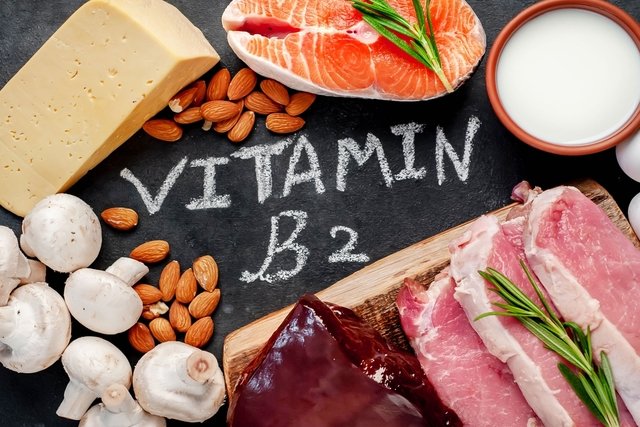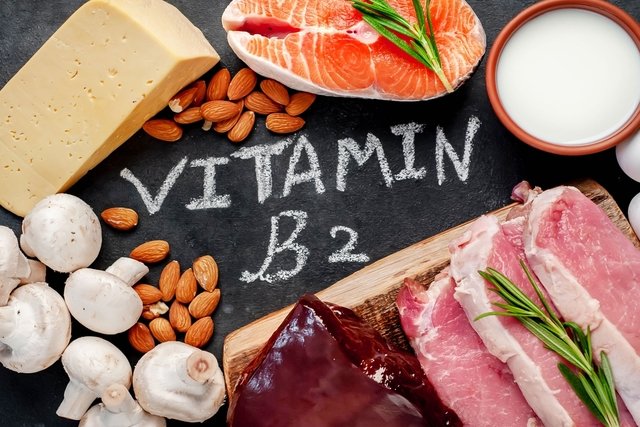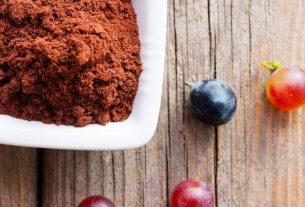Vitamin B2, or riboflavin, is an essential vitamin for several functions in the body, such as stimulating blood production, increasing energy, promoting child growth and healing.
Furthermore, vitamin B2 also helps prevent the onset of cardiovascular diseases and migraines, as this vitamin has antioxidant and anti-inflammatory activities.
Riboflavin is naturally present in foods such as milk, yogurt, eggs, beef liver, soybeans and peas. In addition, vitamin B2 can also be found in the form of capsule supplements. See a list of foods rich in vitamin B2.

What is it for
Vitamin B2 performs the following functions in the body:
- Promote energy productionas it participates in the metabolism of carbohydrates, proteins and fats in the body;
- Stimulate blood production, as vitamin B2 is important for the formation of red blood cells;
- Prevent cardiovascular diseases, because it regulates the levels of homocysteine in the blood, an amino acid that, in large quantities, increases the risk of heart disease;
- Participate in child growth and healing, as it plays a fundamental role in the formation and repair of cells and tissues;
- Relieve migraines, because it has antioxidant and anti-inflammatory action, helping to combat and prevent migraines;
- Maintain thyroid health, as it acts in the regulation of thyroid enzymes.
In addition, vitamin B2 is also important for other vitamins in the B complex, such as vitamins B6, folic acid and vitamin B12, to perform their functions in the body.
Foods rich in vitamin B2
Vitamin B2 is found mainly in brewer’s yeast and foods of animal origin, such as milk, cheese, yogurt and beef liver.
Furthermore, this vitamin is also found in foods of plant origin, such as pequi, oats, mushrooms, soy and watercress. Check out other foods rich in vitamin B2.
Recommended daily amount
The recommended daily amount of vitamin B2 varies according to the person’s age, stage of life and sex:
Breastfeeding women need to consume 1.6 mg of vitamin B2 per day. For pregnant women, the daily recommendation for vitamin B2 is 1.4 mg.
When to use supplements
Vitamin B2 supplements may be indicated in situations of high risk of deficiency of this vitamin, such as alcoholism, the elderly, pregnancy, diets low in riboflavin or use of medications such as oral contraceptives, probenecid, chlorpromazine, phenothiazines, barbiturates, streptomycin and penicillin.
Furthermore, this supplement can also be recommended for people with changes in intestinal absorption or diseases such as HIV, tuberculosis, hyperthyroidism and diabetes.
Vitamin B2 supplements can be found in the form of capsules, ranging from 10 to 500 mg, and the dosage is recommended according to the person’s age and the objective being treated.
Therefore, vitamin B2 supplements should only be used under the advice of a doctor or nutritionist.
Vitamin B2 deficiency
Vitamin B2 deficiency can cause signs and symptoms such as inflammation and sores on the lips, red and swollen tongue, red and itchy eyes, tiredness, hair loss, growth retardation, sore throat, skin inflammation and anemia.
Bibliography
- CLEVELAND CLINIC. Riboflavin Tablets. Disponível em: <https://my.clevelandclinic.org/health/drugs/19116-riboflavin-tablets>. Acesso em 02 mar 2023
- BRASIL INTERNATIONAL LIFE SCIENCES INSTITUTE DO BRASIL. Fully recognized functions of nutrients: B vitamins. 2018. Available at: <https://ilsibrasil.org/wp-content/uploads/sites/9/2018/10/Fasc%C3%ADculo-COMPLEXO-B-009.pdf>. Accessed on March 2, 2023
- HARVARD SCHOOL OF PUBLIC HEALTH. Riboflavin – Vitamin B2. Disponível em: <https://www.hsph.harvard.edu/nutritionsource/riboflavin-vitamin-b2/>. Acesso em 02 mar 2023
- NATIONAL INSITTUTES OF HEALTH. Riboflavin: Fact Sheet for Health Professionals. Available at: <https://ods.od.nih.gov/factsheets/Riboflavin-HealthProfessional/>. Accessed on March 2, 2023

Sign up for our newsletter and stay up to date with exclusive news
that can transform your routine!
Warning: Undefined array key "title" in /home/storelat/public_html/wp-content/plugins/link-whisper-premium/templates/frontend/related-posts.php on line 12
Warning: Undefined array key "title_tag" in /home/storelat/public_html/wp-content/plugins/link-whisper-premium/templates/frontend/related-posts.php on line 13





